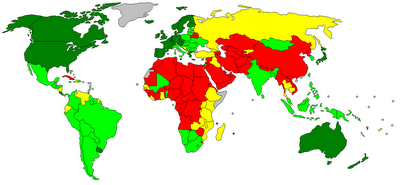Perhaps one of the more interesting and relevant reports to come out this week has been the 2007 update of "Freedom in the World", released annually by the think-tank Freedomhouse. They have been gathering information on political and civil freedoms across the world since 1972. The following is a self-made map cataloguing the status of freedom this year (Green covers the "Free" states, Yellow "Partly Free" and Red "Not Free").
 A major theme this year is how the number of countries in each status has remained approximately the same in the past 15 years or so (although the number of free countries is much higher than, say, in 1981, largely owing to political developments in Eastern Europe, Latin America, Southern Africa and East Asia).
A major theme this year is how the number of countries in each status has remained approximately the same in the past 15 years or so (although the number of free countries is much higher than, say, in 1981, largely owing to political developments in Eastern Europe, Latin America, Southern Africa and East Asia).You can check out the report for an explanation of their methodology and scores. Their compiled comparative data can be seen here. I confess that playing with this information was a passtime of mine in whiling away the long hours in Peace Corps.
It is interesting to compare the scores with the Economist Intelligence Unit's new Democracy Index Survey. Their ratings of countries is a bit more graded, and as a result a great deal fewer countries get to stand next to Sweden and FInland near the top. Here is a self-made map of their results (Dark green for Full Democracy, Light Green for Flawed Democracy, Yellow for Hybrid Regime and Red for Authoritarian Regime).

Some similarities, some differences. Nevertheless, one can see that, as mentioned above, Latin America, Eastern Europe, Southern (and parts of Western) Africa, and parts of East Asia are seeing some political gains. Much of the rest of the world is not, or is in some sort of quasi-authoritarian limbo (but much less of it ruled by military regimes or one party states than before 1991). And, despite all the best efforts of its populace and leaders to the contrary, North America, Western Europe, Japan and Australasia still rank at the top of the list. As they say, democracy is the worst form of government, except for all the others. Maybe that is the scariest lesson!
3 comments:
USA should be listed as flawed Democracy
I believe some of the Freedomhouse and EIU literature attached to these reports do hint that there are major problems with the political system in America. One problem with the Freedomhouse ratings is that both political and civil freedoms have ratings of 1-7 (with the overall freedom of the country being the average of the two). The end result is that sometimes it is hard just to tease out the differences between countries: China and Turkmenistan are both 7s, as I believe, although the two are radically different societies, the former probably a lot freer than the latter. Likewise, Sweden, Switzerland, France, UK and the USA - or Nauru or Antigua for that matter - are all 1's, although there are different freedoms and sociopolitical issues in them all. Freedomhouse does have its biases (there are a lot of notable neoconservatives and interational liberals united in their pro-western democracy leanings among thier Board of Trustees, including Malcolm Forbes, Jean Kirkpatrick, PJ O'Rourke - he more a libertarian - and Ruth Wedgwood). The biases are shown when Ukraine magically became "free" when Yushchenko was elected president.
As for the EIU ratings, you'll have to check with them how they rated as they did, as I am less familiar with their methodology. At least they had the guts to call countries like Italy, Israel and the central European states flawed democracies. Italy, in contrast, got a 1 (highest) rating by Freedomhouse. Even the US on the EIU scale got a rating the same as the Czech Republic, so even if it is a full democracy you can appreciate the irony that the US scores the same as a post-communist Central European state that wasn't able to elect a government this year.
Ultimately this proves how things like statistical social sciences are a bit of a sham. You can definitely show statistics on things like earthquakes or temperatures, and even on things like sales or GNP, but once you get into squishier subjects like strength and frequency of democracy or of war, then the statistics are a little more of a game than a hard science.
Beware social sciences! The statistics are only as good as the definitions that they are used to prove/disprove. These definitions are much more biased than those in hard science.
Especially when trying to compress all the dynamics of a social order or State into a single numerical index, the task is impossible. It is as good as a subjective ranking a traveller would come up with.
Post a Comment